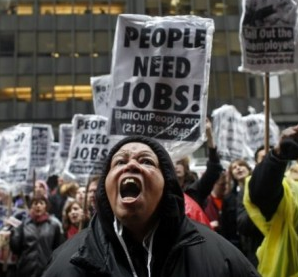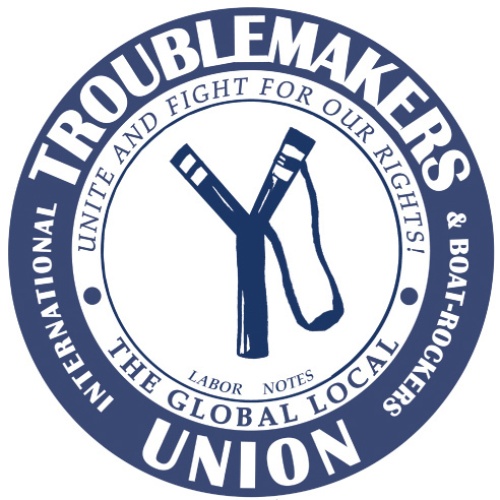Can labor organize the unemployed?

By Jenny Brown, Labor Notes
Wrenching testimonies from laid-off workers are overflowing the internet, crying out from the pages of policy reports, and popping up in commercial media. But unions are still grappling with how to organize the unemployed, including their own ex-members, into a political force.
Department of Labor figures for December showed 13.1 million unemployed and actively looking for work, almost half of them for more than six months. Another 8.1 million were working part-time involuntarily, and 2.5 million were too discouraged to look for work.
Unfortunately, unions don't do a good job of organizing this vast pool said Tom Lewandowski, who spent nine years on layoff from GE starting in 1975.
Now, as president of the Northeast Indiana Central Labor Council in Fort Wayne, he's leading an effort to survey unemployed workers, watchdog the county's economic development, and demand accountability from the unemployment office for laid-off workers struggling to navigate the system.
No shame
Jobs with Justice chapters have been experimenting with organizing the unemployed, but at a recent conference activists expressed frustration. The model of "unemployed" as an identity group (like race or sex) hasn't worked, many said.
"How do you organize the unemployed when people don't want to identify themselves as unemployed?" asked Susan Hurley, executive director of JwJ in Chicago.
Hurley said she tries to communicate that there's no shame. "These are structural problems in our economy, it's not about personal failings of anyone who's out of work right now -- 14 million people can't be wrong," she says. The group has set up an Unemployed Action Center, open one day a week with computer resources, action-planning meetings, and free lunches.
"The isolation and shame is really tough," said laid-off Chicago electrician Carole Ramsden. "Especially union members, you have a lot of pride of working at your job, and all of a sudden you lose that." When she was laid off three years ago, 2,000 members of her local were ahead of her on the list waiting for work.
Some unions have reacted with help for laid-off members. The Transport Workers in New York City voted to pay $5 in extra dues for six months to maintain health insurance for unemployed members. Many of them are now back at work.
A Sheet Metal Workers local in Philadelphia voted several extensions for supplements to unemployment benefits for their members, and in April they voted overwhelmingly to divert an additional 50 cents per hour worked from their welfare fund to support those who’ve run out of unemployment benefits.
Staying connected
In construction trades like sheet metal, unemployed workers are still dues-paying members and can retain a connection with their union, attending meetings and brushing up their skills with training programs.
But other laid-off union members are harder to track.
The Chicago Federation of Labor has given Jobs with Justice lists of members from plants with mass layoffs, Ramsden said.
Latoya Egwuekwe of the Machinists said 35,000 IAM members had been laid off nationwide by January 2010. In response, the union set up Ur Union of the Unemployed (U Cubed), a website designed to connect the unemployed to each other. Fourteen months later, 4,000 had signed up.
The idea was to have unemployed folks get together in person, but the result so far has been largely to generate advocacy emails to politicians.
The AFL-CIO's community affiliate Working America set up a similar networking site in 2009, Unemployment Lifeline, and on Labor Day last year launched "America Wants to Work" to lobby for the Obama administration's jobs bill.
The effort focuses on sending postcards and online petitions to politicians, although some efforts, like New Mexico Wants to Work, have produced organizing meetings.
But you can't organize the unemployed "at 10,000 feet," said Lewandowski of the many internet networks set up for the purpose.
Put a face on it
Unemployed Action Center members in Chicago have been rallying the first Friday of each month, the day the Department of Labor's jobs report comes out. They draw press coverage when their colorful signs and personal stories compete with dry jobs numbers.
Following Chicago's example, Jobs with Justice in Atlanta held press conferences the last three months of 2011, highlighting Georgia's miserable rankings in national jobs statistics. They've also been fighting state legislation that would cut benefits by $30 a week and force the unemployed to work 24 hours a week as "volunteers," said Charmaine Davis of Atlanta JwJ.
Still, activists agreed, it's hard to make political activities feel worthwhile to people who expect to be evicted next month. "When you’re unemployed, you've got to be doing something, but at the same time, you've got to figure out how to survive," Ramsden said.
Pushing for a jobs bill in Washington may seem too distant, while the computer access and resume coaching provided by many unemployed projects can only help workers compete against other workers for scarce jobs.
The economic development scam
"When we say 'jobs,' the corporate class says 'economic development,'" said Tom Lewandowski of the Northeast Indiana Central Labor Council. But, Lewandowski said, governments' policy of delivering big subsidies to create jobs is "pretty much fraudulent."
The unemployed initiative in Fort Wayne has been uncovering abuse and confronting public officials. It's following the lead of Good Jobs First, a policy center in Washington, D.C., that tracks the sweetheart deals that pass for job creation in many cities and states.
The Indiana group discovered that the state's Economic Development Corporation regularly exaggerates its success at job creation. A company may have claimed it would hire people full-time at $15 an hour, but when group members investigated, they found temp jobs at minimum wage, or empty cornfields receiving tax breaks for "job creation."
They fed the info to an Indianapolis TV station, which produced an award-winning report.
Public subsidies even go to contractors that are undermining union jobs. Gayle Goodrich, an Auto Workers benefits rep at Navistar in Fort Wayne, said that after layoffs in 2007, workers sent to the unemployment office were directed back to their own plant under contract to another company, at lower pay and no benefits. They learned that the contractor had been subsidized by economic development funds.
In December the plant closed, and the union won $7 million in job training and relocation assistance for 400 laid-off Navistar workers, when it was able to prove that many of their jobs were being sent overseas and not to Illinois as the company had claimed.
Discrimination
Local campaigns on unemployment often veer towards a more manageable and familiar fight, against discrimination in hiring.
A December 1 report by USAction, a Democratic policy group, collected 700 stories from the unemployed to pressure Congress for jobs spending and extended unemployment benefits.
Age discrimination was mentioned by dozens of participants, as was discrimination against workers simply for being unemployed.
A 61-year-old in Pinellas Park, Florida, said, "There are no openings for mature women when there are so many people available to do entry level work." The report also noted that recent high school and college graduates are unable to find jobs.
Legislation to stop discrimination against unemployed applicants has been introduced in California, and New Jersey adopted a law to ban job ads that specify "employed only."
UNITE HERE, the hotel union, has joined with civil rights groups and the National Organization for Women to target TransUnion. That company sells credit reports to employers, creating another Catch-22 for those trying to get back on their feet. The groups say the practice disproportionately affects African Americans, Latinos, and women -- and anyone without a job.
In Atlanta, an unemployed speak-out organized by JwJ exposed discrimination faced by the formerly incarcerated, a group facing 25 percent unemployment in Atlanta, Davis said.
The effort looks to follow a successful campaign in Massachusetts to "ban the box." The check-box on applications where ex-felons must disclose their status often means they can't even secure job interviews. When they are able to get in the door and explain their situation, their chances of getting hired go up dramatically, Davis said.
An energetic ban-the-box campaign in Atlanta has been led by the people affected, Davis said, whereas more general unemployed organizing has not gained much traction.
"It's easier to organize on issues versus problems," she said. "Lack of jobs is a huge problem, there are so many factors that contribute to it. It's easier to say 'this group is dealing with high unemployment'" because of discrimination, and try to fix that.
Duty of representation
Lewandowski said central labor bodies should think of themselves as representing unemployed workers, and should consult them like a union would, "in preparation for bargaining."
The Indiana initiative has been distributing surveys at food banks, on public transit, and at unemployment offices. Complaints about the unemployment office on surveys last year led to a meeting between unemployed workers and the office's directors. The unemployed workers confronted them about aggravating run-arounds and lack of information on job-training money.
Recently, Occupy Fort Wayne members hit the buses with this year's version of the survey, listening to the unemployed, starting conversations about the economy, and explaining Occupy to the curious.
"Once you've heard someone’s story," Lewandowski said, "you have a burden of representation."
Tags
Labor Notes
Labor Notes is a media and organizing project that has been the voice of union activists since 1979.
